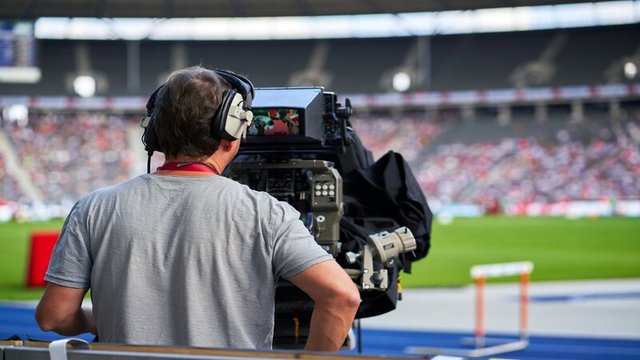
TV rights in sport – what are they?
April 4, 2024

In the exhilarating world of sports, the roar of the crowd and the thrill of victory are often accompanied by another crucial element that shapes the landscape of athletic competition: television rights.
As the sporting industry continues to thrive, TV rights in sport have emerged as a pivotal component, dictating the visibility and financial prosperity of leagues and events worldwide. In this post, we’ll look in detail at the intricate realm of TV rights in sports, tracing their evolution, unravelling the acquisition process, and exploring career avenues within this dynamic field.
What are TV rights in sport?
TV rights encompass the contractual agreements between sports leagues, teams, or event organisers and television networks, granting broadcasters the exclusive privilege to air live matches, tournaments, or events.
These rights allow networks to broadcast games to audiences globally, generating substantial revenue streams through advertising, subscription fees, and sponsorships.
Evolution of TV rights in sport
The evolution of TV rights in sports mirrors the transformation of the sporting industry itself. Initially, live sports coverage was limited to terrestrial television channels, offering viewers a handful of matches or events.
However, with the advent of cable and satellite television, the landscape underwent a seismic shift. The proliferation of dedicated sports channels and pay-per-view platforms ushered in an era of unprecedented access, enabling fans to watch their favourite teams and athletes from the comfort of their homes.
In recent years, the digital revolution has further reshaped TV rights, with streaming platforms entering the fray. Tech giants and online broadcasters have secured lucrative deals, tapping into the growing demand for on-demand and mobile viewing options.
As consumption habits continue to evolve, the battle for TV rights has intensified, with stakeholders vying for exclusive content to capture larger audiences and maximise revenue potential.
Acquiring TV rights in sport
The process of acquiring TV rights in sports is a multifaceted endeavour, often characterised by intense negotiations and fierce competition. Leagues and event organizers typically conduct bidding processes, inviting broadcasters to submit proposals outlining their programming strategies and financial offers. Factors such as audience demographics, broadcast reach, and advertising potential play a crucial role in determining the value of TV rights.
Once a broadcaster secures the rights to a particular league or event, they assume responsibility for production, marketing, and distribution. This includes deploying camera crews, commentators, and technical personnel to capture and broadcast live footage, as well as promoting the coverage through various marketing channels.
Examples of TV rights in sport
One prime example of the significance of TV rights in sports is the English Premier League (EPL). Renowned for its global appeal and competitive fervour, the EPL boasts one of the most lucrative TV rights deals in the world.
Broadcasters such as Sky Sports and BT Sport have invested billions of pounds to secure exclusive coverage rights, ensuring comprehensive access to matches for viewers across the UK and beyond.
Career path in TV rights in sport
For aspiring professionals seeking to embark on a career in TV rights in sports, a multidisciplinary approach is essential. While a background in media, broadcasting, or communications provides a solid foundation, specialised knowledge of sports management, marketing, and negotiations is equally valuable.
Pursuing relevant qualifications such as a Master in Sports Journalism Real Madrid, Sports Marketing master, or Online Sports Marketing master can enhance your prospects in this competitive field.
Additionally, gaining practical experience through internships or work placements at sports media companies, broadcasting networks, or sports leagues can provide valuable insights and networking opportunities, which is a key component to all our programmes at Universidad Europea.
In conclusion, TV rights in sports represent a cornerstone of the modern sporting landscape, shaping the viewing experience for millions of fans worldwide while fuelling the economic engine of the industry. By understanding the intricacies of TV rights acquisition, aspiring professionals can position themselves for success in this dynamic and ever-evolving field, unlocking exciting career opportunities in the world of sports media and broadcasting.